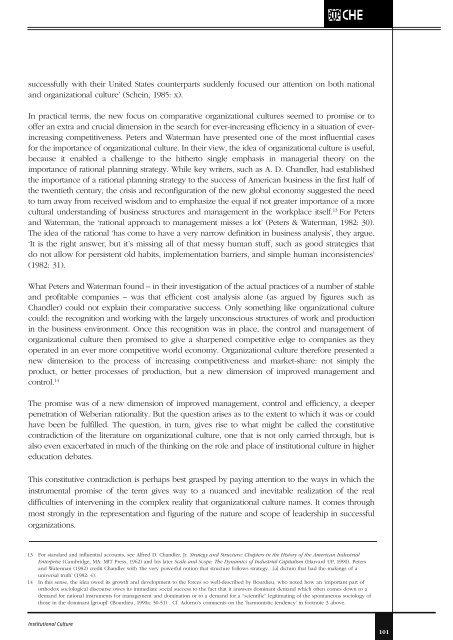INSTITUTIONAL CULTURE AS KEYWORD John - CHE
INSTITUTIONAL CULTURE AS KEYWORD John - CHE
INSTITUTIONAL CULTURE AS KEYWORD John - CHE
Create successful ePaper yourself
Turn your PDF publications into a flip-book with our unique Google optimized e-Paper software.
successfully with their United States counterparts suddenly focused our attention on both national<br />
and organizational culture’ (Schein, 1985: x).<br />
In practical terms, the new focus on comparative organizational cultures seemed to promise or to<br />
offer an extra and crucial dimension in the search for ever-increasing efficiency in a situation of everincreasing<br />
competitiveness. Peters and Waterman have presented one of the most influential cases<br />
for the importance of organizational culture. In their view, the idea of organizational culture is useful,<br />
because it enabled a challenge to the hitherto single emphasis in managerial theory on the<br />
importance of rational planning strategy. While key writers, such as A. D. Chandler, had established<br />
the importance of a rational planning strategy to the success of American business in the first half of<br />
the twentieth century, the crisis and reconfiguration of the new global economy suggested the need<br />
to turn away from received wisdom and to emphasize the equal if not greater importance of a more<br />
cultural understanding of business structures and management in the workplace itself. 13 For Peters<br />
and Waterman, the ‘rational approach to management misses a lot’ (Peters & Waterman, 1982: 30).<br />
The idea of the rational ‘has come to have a very narrow definition in business analysis’, they argue.<br />
‘It is the right answer, but it’s missing all of that messy human stuff, such as good strategies that<br />
do not allow for persistent old habits, implementation barriers, and simple human inconsistencies’<br />
(1982: 31).<br />
What Peters and Waterman found – in their investigation of the actual practices of a number of stable<br />
and profitable companies – was that efficient cost analysis alone (as argued by figures such as<br />
Chandler) could not explain their comparative success. Only something like organizational culture<br />
could: the recognition and working with the largely unconscious structures of work and production<br />
in the business environment. Once this recognition was in place, the control and management of<br />
organizational culture then promised to give a sharpened competitive edge to companies as they<br />
operated in an ever more competitive world economy. Organizational culture therefore presented a<br />
new dimension to the process of increasing competitiveness and market-share: not simply the<br />
product, or better processes of production, but a new dimension of improved management and<br />
control. 14<br />
The promise was of a new dimension of improved management, control and efficiency, a deeper<br />
penetration of Weberian rationality. But the question arises as to the extent to which it was or could<br />
have been be fulfilled. The question, in turn, gives rise to what might be called the constitutive<br />
contradiction of the literature on organizational culture, one that is not only carried through, but is<br />
also even exacerbated in much of the thinking on the role and place of institutional culture in higher<br />
education debates.<br />
This constitutive contradiction is perhaps best grasped by paying attention to the ways in which the<br />
instrumental promise of the term gives way to a nuanced and inevitable realization of the real<br />
difficulties of intervening in the complex reality that organizational culture names. It comes through<br />
most strongly in the representation and figuring of the nature and scope of leadership in successful<br />
organizations.<br />
13 For standard and influential accounts, see Alfred D. Chandler, Jr. Strategy and Structure: Chapters in the History of the American Industrial<br />
Enterprise (Cambridge, MA: MIT Press, 1962) and his later Scale and Scope: The Dynamics of Industrial Capitalism (Harvard UP, 1990). Peters<br />
and Waterman (1982) credit Chandler with ‘the very powerful notion that structure follows strategy…[a] dictum that had the makings of a<br />
universal truth’ (1982: 4).<br />
14 In this sense, the idea owed its growth and development to the forces so well-described by Bourdieu, who noted how an ‘important part of<br />
orthodox sociological discourse owes its immediate social success to the fact that it answers dominant demand which often comes down to a<br />
demand for rational instruments for management and domination or to a demand for a “scientific” legitimating of the spontaneous sociology of<br />
those in the dominant [group]’ (Bourdieu, 1990a: 50-51) . Cf. Adorno’s comments on the ‘harmonistic tendency’ in footnote 3 above.<br />
Institutional Culture<br />
101






